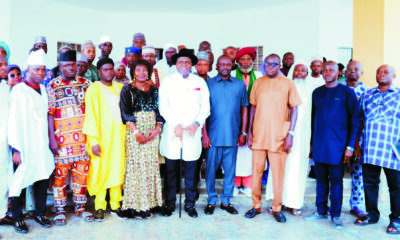Business
Bankers Set To Expand Sub-Saharan African Businesses
Syndicated loan bankers active in Sub-Saharan Africa are hopeful that booming demand for the region’s commodity exports and economic growth rates not far below double digits will provide lenders with a busy deal flow in 2011.
Chinese eagerness to provide loans backed by exports of metals, oil and agricultural products from the region has combined with a leap in loan demand from corporate credits — some big enough to tempt involvement from large, international banks.
Syndicated bank lending to the region reached $19 billion in 2010, a 46 per cent jump from the $13.1 billion reported in 2009, Thomson Reuters data shows — and it is widely expected that the arrival of new loan investors will help to push volumes higher this year.
“The main lenders have known the borrowers for some time, but we are finding new investors all the time. Additionally, Chinese banks are actively involved in commodity-backed deals,” said a London-based loan banker familiar with lending to the region.
“There is also intra-African money supporting growth — for example a bank in East Africa lending to a corporate in West Africa.”
Deals closed recently include a six-month two-tranche deal for Ghanaian cocoa purchasing business Produce Buying Co, previously owned by experienced borrower Cocobod, and a hugely oversubscribed loan for Zambian maize marketing organisation Food Reserve Agency.
Acting as arranger, Standard Chartered completed both deals at the end of November last year. The $50 million Produce Buying Co deal was joined by four banks and four funds, and Ghana’s Cocoa Board holds the payment risk.
Without any significant bond market, and tight restrictions on those wanting to shift cash out of most SSA countries, bank loans are an attractive home for domestic investors to put their money.
“Because of strong economic growth across Africa there is liquidity in domestic systems. With money staying in the system, local investors can put their money in property, the stock market or in the corporate loan market,” said the loans banker.
But much of this growth has relied on commodities. Higher prices for commodity exports have helped many of the 34 countries that make up the SSA region to resist the global economic slowdown.
Commodity-related financings accounted for almost 60 per cent of all lending to the region in 2010, with oil and gas taking 29 per cent, mining 17 per cent and agriculture 14 per cent, according to Thomson Reuters’ data.
John MacNamara, global head of structured commodity trade finance at Deutsche Bank, said that oil production across SSA would also bolster project finance lending in the region over the next few years, particularly as several countries look towards pumping their first barrels of oil
Maritime
Shippers’ Council Registers 160 Port Operators

The Nigerian Shippers Council (NSC) says it has registered 160 Port stakeholders into its Regulated Port Service Provider and Users platform since the initiative began in 2023.
Executive Secretary, NSC, Mr Pius Akutah, made the disclosure on the sideline of a sensitisation programme by the commission for port operators in Lagos, with the theme, “Regulated Port Service Provider and Users”.
Represented by the Director, Consumer Affairs, Chief Cajetan Agu, Akutah emphasised the significance of the programme for stakeholders.
He said the sensitisation programme was the second edition after its commencement during the last quarter of 2023.
The Secretary said the 160 registered port operators consist of agencies, terminal operators, shipping companies, individual port users as well as service providers.
“We invited the ports stakeholders for enlightening them on the processes for online registration of Regulated Port Service Provider and Users.
“We have demonstrated to them how to register and how to make payment and we were able to present before them the various categories of the registration.
“The rate of payment is also in the registration. The payment of each group depends on the operation. A shipper pays N30,000, terminal operators and shipping companies pay N300,000, truckers also pay N30,000, while some pay N50,000 and N100,000.
“The Council was able to intimate them on the benefits, because port users benefit more as we help to interface on reducing port charges from time to time”, Akutah said.
He said that there was a need to continue to work with port operators to stop delays and eliminate high costs to make the port efficient.
Also speaking, the Deputy Director, Stakeholders, Service, NSC, Mr Celestine Akujobi, said “the sensitisation exercise was important for the council to enable us bring all the port stakeholders together”.
According to him, this is to avoid challenges during the implementation of the council’s responsibilities.
“By the time we introduce sanctions on defaulters, no operators will complain that he or she is not aware of the registration.
“I’m happy with the turnout of this sensitisation. This shows that the operators are well informed of the statutory friction of the council as the port regulator.
“The final implementation will commence as soon as we discover that all the operators have keyed into the portal.
“We are engaging other ports across the country and we’re hopeful that before the last quater of 2024, the council will implement sanctions on defaulting operators”, Akujobi said.
Earlier, Vice Chairman, National Association of Government Approved Freight Forwards (NAGAFF), Dr Ifeanyi Emoh, said port challenges were enormous, adding that they originated from some of the government agencies.
Emoh urged the council to look into regulating other government agencies, so that there could be a window through which they can collect port charges collectively instead of indiscriminately.
By: Chinedu Wosu
Business
Chivita, Hollandia Reward Outstanding Trade Partners At Annual Conference

Chivita| Hollandia (CHI Limited) leading fruit juice and value-added dairy manufacturer in Nigeria has rewarded its long standing distributors at the recently held 2024 Distributor Conference. The event with the theme, “Break Boundaries Exceed Expectations” served as a platform to recognise and reward the exceptional contribution of the distributors and wholesalers who play a critical role in Chivita|Hollandia (CHI Limited) success and business goals for the year.
The Distributor Conference was held in two sessions. While the morning session featured keynote addresses, industry insights and brand immersion experience, the evening session was a cultural display of elegance and funfair that culminated in the award presentation and recognition of the contribution the trade partners made to the company in the 2023 year under review.
A key highlight of the event was the award ceremony which acknowledged outstanding trade partners in various regions across the country. The awards recognized commitment, dedication, and outstanding performance in areas of sales growth, brand promotion, and market expansion.
Eelco Weber, Managing Director, Chivita|Hollandia (CHI Limited), stated that the company’s success story is incomplete without the strong partnerships it has built with trade partners. “Today, we celebrate not only the achievements, but the collaborative spirit that has made our growth possible” he said.
Bola Arotiowa, Chief Commercial Officer, Chivita|Hollandia (CHI Limited), in his statement revealed that, the event which was first of its kind will continue to be an annual meeting to enable the company work more closely with its distributors, share insights and action points, help the trade partners familiarize themselves with the company’s goals and objectives for each year, and serve as a driver for mutual success.
“Our distributors are the backbone of Chivita|Hollandia (CHI Limited). Their relentless efforts in distributing our products, promoting our brands, and expanding our reach across the nation is truly commendable. As the bridge between us and our valued consumers, it is very important to reward their hard work and dedication for being an essential part of the Chivita|Hollandia (CHI Limited) family. Together, we will continue to deliver great products to our conusmers which in turn will deliver value to them”, Mr. Arotiowa added.
Speaking at the conference, HajiyaBilikisuSaida, Chief Executive Officer of Smabirm Nigeria Limited, who won the Outstanding Distributor of the Year in North 1 region, and got a reward of two million Naira worth of Chivita|Hollandia (CHI Limited) products expressed delight at the company’s recognition, and stated that the awards served as a way to inspire distributors to do more and put in more effort, which in turn would help both the distributors and the company to grow.
Other outstanding performance distributors of the year rewarded with a two million Naira worth of Chivita|Hollandia (CHI Limited) stock include, Sunny Chuks Limited for East 1 region, MRS FA & Sons Limited for East 2 region, Hussakas Ventures for North 2 region, Rookee 1388 Ventures for Lagos 1 region, Pik N Pil Ventures for Lagos 2 region, FaithJoe Event Management Limited for West 1 region, and Progress Family Nigeria Enterprise for West 2 region.
The annual Distributors Conference aims to strengthen the bond between Chivita|Hollandia (CHI Limited) and its trade partners. This collaborative approach fosters mutual growth and ensures the continued success of the brands in the Nigerian market.
Business
AXA Mansard Backs Female-Owned MSMEs With N1.4m Grant

A global leader in insurance and asset management, AXA Mansard, has supported three female-owned MSMEs with business grants totaling 1.4 million to boost their operations.
This, the company said, is part of its commitment to women and the Medium, Small, and Medium-scale Enterprise (MSME) sector in the country.
The three businesses were successful at the International Women’s Day Pitch Competition, organised in partnership with SME 100 Africa in Lagos.
According to the Head of Marketing, AXA Mansard, Olusesan Ogunyooye, the competition, which is aimed at supporting female entrepreneurs in Nigeria, “is another way AXA is demonstrating its commitment to the causes of women and stimulating the MSME sector in Nigeria”.
The business pitch competition received numerous entries from women across different sectors, but after a rigorous selection process, shortlisted participants were selected to participate in the competition.
Ogunyooye said “the programme provided a unique opportunity for women from various works and socio-economic classes to showcase their innovative ideas and solutions in sectors such as food, tech, fashion, and fragrance, creating an atmosphere filled with excitement, enthusiasm, and a strong sense of community”.
He stressed the importance of investing in women, saying it is not just the right thing to do, but also aligns with AXA’s purpose of acting for human progress.
He explained that AXA believes the future of women should not be at risk, hence investing in their economic empowerment is a crucial part
-
Business4 days ago
Boat Mishap: CILT Advocates Safety Culture On Waterways …Claims 300 Nigerians In 2023
-

 Niger Delta4 days ago
Niger Delta4 days agoNCDMB Boss Lauds SNEPCO, Others Over Project Execution
-

 Business4 days ago
Business4 days agoAFEX Launches Impact Report On Food Security
-
Oil & Energy4 days ago
FG Explains Sulphur Content Review In Diesel Production
-

 News4 days ago
News4 days agoNGF Advocates Safer Transportation Of Petroleum Products
-

 Maritime4 days ago
Maritime4 days agoDrydock To Complete LAGFERRY Maintenance, Aug -Commissioner
-
Business4 days ago
LASG Makes Over N500m From Traffic Offences
-

 Education4 days ago
Education4 days agoVC Demands Improved Power Supply For University

